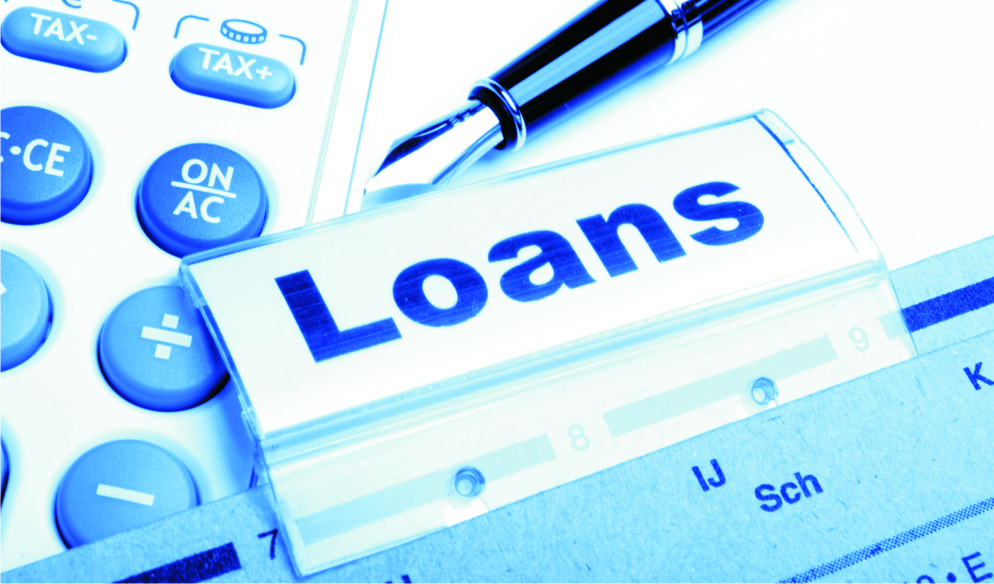Business
Bank Loans Hit N26.41trn In 2019

A significant increase on credit offered by banks to the private sector has been recorded as bank loan rose from N22.94 trillion in January 2019 to N26.41 trillion as of November 2019.
This is an increase of 15% (N3.47 trillion), according to analysis of data published by the Central Bank of Nigeria (CBN), recently.
In recent years, the CBN has continued to compel banks to boost their credit to the real sector of the economy.
Analysis of data published by the apex bank revealed that the loans increased by N3.46 trillion in 2019 , between January and November, 2019.
According to the report, at the end of November 2019, the total net domestic credit in the Nigerian economy rose from N28.65 trillion in January to N35.51 trillion. This means that the net domestic credit in the economy rose by N6.86 trillion or 23.9%.
Out of the total N35.51 trillion net credit in the domestic economy, credit to private sector rose to N26.4 trillion, while credit to government also rose to N9.10 trillion.
This shows that credit to private sector constitutes 74%, while credit to government constitutes 26% of the total net domestic credit.
– Advertisement –
During the year, credit to private sector hits the highest in December 2019, while credit to the government rose to the highest in October.
A closer look at the report shows that credit to government dropped by N1.35 trillion between October and December 2019.
Across the sectors, as at the end of September 2019, the oil and gas sector recorded the biggest gross domestic loan estimated at N4.50 trillion, followed by manufacturing N2.56 trillion and Government N1.34 trillion.
In 2019, the CBN increased the LDR for Deposit Money Banks (DMBs) twice from 55% to 60%, and later to 65%. In December 2019, several media reports revealed the plans of the CBN to increase the LDR to 70% in 2020.
According to the CBN, the major reason for the newly revised LDR was the noticeable “growth in the level of the industry gross credit”.
There were media reports last year that banks have continued to lower their lending and deposit rates as they struggled to comply with the apex bank’s December 31, 2019 deadline.
Already, criticisms have trailed the current 65% LDR ratio, as experts argue that it might increase the level of non-performing loans in the economy. For instance, the International Monetary Fund (IMF) recently disclosed that the balance sheets of banks would be weak due to the LDR’s directive from the CBN.
In an earlier report, the CBN stated that three banks failed to meet the 30% minimum liquidity ratio requirement of the apex bank.
With the 30% banks’ liquidity ratio, it means there is a limit the CBN can push banks to lend money by raising the LDR.
A look into the value of the Non-Performing Loans (NPL) across sectors showed that NPL in the agriculture, construction, and education among others hit N143.76 billion as at the end of September 2019.
Business
Bayelsa Begins EIA On 60MW Power Plant

The Bayelsa Electricity Company Ltd, in collaboration with the Federal Ministry of Environment, on Friday, commenced the Environmental Impact Assessment (EIA) for the proposed 60-megawatt (MW) power plant.
The Tide’s source reports that the power plant project, led by the Bayelsa State Government, is in Elebele, on the outskirts of Yenagoa, the state capital.
The source also reports that the State Governor, Douye Diri, had announced plans to establish an independent power project to end the state’s reliance on the national grid and provide an uninterrupted power supply across Bayelsa.
The Director of Operations at the Bayelsa Electricity Company Ltd., Steve Bubagha Jnr., conducted the Minister of Environment, Balarabe Lawal, and his team around the project site.
Mr. Bubagha explained that the company planned to install a 60MW “plug and play” gas-fired turbine that would receive gas feed from the Oando gas manifold in Elebele.
He said the land area for the project is approximately 5.8 hectares, with 2.1 hectares currently being used.
“The Independent Power Plant is officially known as the ‘Yenagoa Power Project. This is a ‘Plug and Play’ Gas Turbine.
“What we mean by ‘plug and play’ is that the turbine is already set to be installed upon arrival from the manufacturers.
“We are only working on other components, so the turbine should be running in less than two years, or at most, in two years”, Bubagha explained.
Following the site visit, the environment minister, represented by Adimchinobi Okereke, emphasised that the purpose of the visit was to ensure the EIA process adhered to standard guidelines before granting final approval to the project.
He lauded the state government for initiating the project, noting that once completed, it would benefit Bayelsa and contribute to solving Nigeria’s power supply challenges.
Azibola Inegite, a professor and Dean of the Faculty of Science at Niger Delta University, and the EIA consultant for the project, assured that international best practices would be followed in conducting the EIA.
He emphasised that the EIA was essential for the successful execution of impactful land and environment-related projects.
On his part, the technical adviser on Print Media/Public Affairs to Governor Diri, Wisdom Ikuli, commended the Governor for his vision in executing the project.
He stated that the 60MW power plant would help reduce the state’s frequent power outages and boost business growth, thereby accelerating industrialisation.
A key part of the minister’s visit was the “Stakeholders Engagement Scoping Workshop for Environmental Impact Assessment of Proposed Gas Powered Plant and Gas Delivery Pipeline in Bayelsa State”.
The workshop brought together stakeholders from Elebele, whoch include the host community, and Kpansia, an impacted community in Yenagoa Local Government Area.
Business
Firm Unveils Solutions To Oil Logistics Challenges

A firm, Fortune Global Shipping and Logistics Limited, said it has concluded plans to unveil an excellent and cost-effective logistics solution for oil and gas logistics, project cargo, customs clearance, consolidation, and construction, among others, in Lagos State.
Announcing this in a statement on Friday, the company said the initiative would be unveiled during the 2025 Sub-Saharan Africa International Petroleum Exhibition and Conference.
It stated that the event is billed to take place in Lagos this week.
SAIPEC is an annual global event which focuses on harnessing a sustainable African energy industry through partnerships.
Fortune Global explained that the exhibition promises to engage with other key industry stakeholders, decision-makers, and experts across Sub-Saharan Africa’s energy supply and value chain.
“We invite you to experience more and find out about Fortune Global’s latest innovations in oil and gas logistics. Connect with Fortune Global Shipping and Logistics Limited at the Exhibition Booth N21, Eko Convention Centre, in Lagos”, the statement stated.
Business
Nigeria, Still Africa’s Largest Economy – World Bank

Nigeria remains the largest economy in Africa going by Gross Domestic Product (GDP), in spite of the challenges faced by yhe country’s private sector.
World Bank’s Country Director for Nigeria, Dr. Ndiame Diop, who confirmed this at the Country Private Sector Diagnostic (CPSD) and Stakeholder Engagement in Abuja, Friday, said while Nigeria receives far less Foreign Direct Investment (FDI) than its potential warrants, especially in comparison to countries like Indonesia and South Africa, it continues to hold its position as Africa’s biggest economy.
He said the CPSD report, set to be released in the coming weeks, will reveal the impact of private sector constraints on economic growth.
Diop noted that if targeted actions were taken to remove these obstacles, Nigeria’s economic potential would be significantly enhanced.
He explained that the current macroeconomic reforms have created a favourable environment for such changes.
He cited the country’s recent economic stabilization measures, particularly exchange rate market adjustments and improved access to foreign exchange, as critical steps that have already enhanced investment conditions.
The Country Director outlined four key sectors where strategic reforms could unlock massive investment and job creation.
He stayed that in the Information Communication Technology (ICT) sector, investment opportunities worth up to $4 billion could be realized, potentially creating more than 200,000 jobs.
In agribusiness, reforms could unlock $6 billion in investment and generate over 275,000 jobs.
The solar photovoltaic (PV) industry holds the potential for $8.5 billion in investment and more than 129,000 jobs, while the pharmaceutical sector could attract $1.6 billion and create more than 30,000 to 40,000 jobs.
For the ICT sector, he identified the high, unpredictable, and inconsistent right-of-way fees, levies, and informal charges, comprising 30 to 70 per cent of broadband rollout costs, as a major barrier.
According to him, addressing these regulatory inconsistencies would be a game-changer for broadband expansion.
He acknowledged that the National Economic Council has recognized this issue and that progress is being made through a World Bank-supported initiative.
He also noted challenges such as vandalism, limited financing for rural broadband expansion, and the need for competitive access to wholesale fiber.
Dr. Diop further noted that efforts are underway in collaboration with government agencies to resolve these issues, and the World Bank, the International Finance Corporation (IFC), and private investors are prepared to support broadband infrastructure development.
On solar power, Diop described Nigeria’s energy sector as difficult but noted that renewable energy access, particularly solar PV, has been a bright spot.
He explained that private sector investment in renewable energy has historically been hindered by high costs and unviable tariffs.
However, blended finance mechanisms supported by the World Bank and IFC have helped bridge this gap, making off-grid solutions more viable.
He noted the DES project, which aims to connect 17.5 million households and businesses to solar power, as evidence of growing private sector interest.
While the solar industry is expanding, he stressed that reforms to improve Nigeria’s grid electricity supply remain crucial for industrialization.
On her part, the Regional Director for Central Africa and Anglophone West Africa at the IFC, Dr. Dahlia Khalifa, stressed the importance of consistency in regulatory policies, particularly in customs duties and revenue agency fees.
She noted that unpredictability discourages private sector investment, as businesses rely on stable regulatory environments for strategic planning.
-

 Sports4 days ago
Sports4 days agoEaglesite Football Academy Targets Grassroots Dev
-

 News3 days ago
News3 days agoRelatives Of Deceased Pension Contributors Get N82bn –PenCom
-

 Niger Delta3 days ago
Niger Delta3 days agoPolice Arrest Boy, 13 For Using Gun To Threaten Colleagues
-

 Opinion4 days ago
Opinion4 days agoEFCC’s Alternative Approach Against Cybercrime
-
News3 days ago
NDLEA Busts Drug Kingpins In PH, Lagos As Suspects Excrete 125 Heroin Wraps
-

 Oil & Energy4 days ago
Oil & Energy4 days agoOPEC+Commits To Monitoring Oil Production Adjustment
-

 Business4 days ago
Business4 days agoNigeria, Still Africa’s Largest Economy – World Bank
-

 News3 days ago
News3 days agoSoludo Rebagged FG Rice Shared To APGA Members-APC

